William Held
Michael Pokorny
Culture Cartography: Mapping the Landscape of Cultural Knowledge
Oct 31, 2025Abstract:To serve global users safely and productively, LLMs need culture-specific knowledge that might not be learned during pre-training. How do we find such knowledge that is (1) salient to in-group users, but (2) unknown to LLMs? The most common solutions are single-initiative: either researchers define challenging questions that users passively answer (traditional annotation), or users actively produce data that researchers structure as benchmarks (knowledge extraction). The process would benefit from mixed-initiative collaboration, where users guide the process to meaningfully reflect their cultures, and LLMs steer the process towards more challenging questions that meet the researcher's goals. We propose a mixed-initiative methodology called CultureCartography. Here, an LLM initializes annotation with questions for which it has low-confidence answers, making explicit both its prior knowledge and the gaps therein. This allows a human respondent to fill these gaps and steer the model towards salient topics through direct edits. We implement this methodology as a tool called CultureExplorer. Compared to a baseline where humans answer LLM-proposed questions, we find that CultureExplorer more effectively produces knowledge that leading models like DeepSeek R1 and GPT-4o are missing, even with web search. Fine-tuning on this data boosts the accuracy of Llama-3.1-8B by up to 19.2% on related culture benchmarks.
SynthesizeMe! Inducing Persona-Guided Prompts for Personalized Reward Models in LLMs
Jun 05, 2025Abstract:Recent calls for pluralistic alignment of Large Language Models (LLMs) encourage adapting models to diverse user preferences. However, most prior work on personalized reward models heavily rely on additional identity information, such as demographic details or a predefined set of preference categories. To this end, we introduce SynthesizeMe, an approach to inducing synthetic user personas from user interactions for personalized reward modeling. SynthesizeMe first generates and verifies reasoning to explain user preferences, then induces synthetic user personas from that reasoning, and finally filters to informative prior user interactions in order to build personalized prompts for a particular user. We show that using SynthesizeMe induced prompts improves personalized LLM-as-a-judge accuracy by 4.4% on Chatbot Arena. Combining SynthesizeMe derived prompts with a reward model achieves top performance on PersonalRewardBench: a new curation of user-stratified interactions with chatbots collected from 854 users of Chatbot Arena and PRISM.
Humanity's Last Exam
Jan 24, 2025Abstract:Benchmarks are important tools for tracking the rapid advancements in large language model (LLM) capabilities. However, benchmarks are not keeping pace in difficulty: LLMs now achieve over 90\% accuracy on popular benchmarks like MMLU, limiting informed measurement of state-of-the-art LLM capabilities. In response, we introduce Humanity's Last Exam (HLE), a multi-modal benchmark at the frontier of human knowledge, designed to be the final closed-ended academic benchmark of its kind with broad subject coverage. HLE consists of 3,000 questions across dozens of subjects, including mathematics, humanities, and the natural sciences. HLE is developed globally by subject-matter experts and consists of multiple-choice and short-answer questions suitable for automated grading. Each question has a known solution that is unambiguous and easily verifiable, but cannot be quickly answered via internet retrieval. State-of-the-art LLMs demonstrate low accuracy and calibration on HLE, highlighting a significant gap between current LLM capabilities and the expert human frontier on closed-ended academic questions. To inform research and policymaking upon a clear understanding of model capabilities, we publicly release HLE at https://lastexam.ai.
Optimizing Pretraining Data Mixtures with LLM-Estimated Utility
Jan 20, 2025Abstract:Large Language Models improve with increasing amounts of high-quality training data. However, leveraging larger datasets requires balancing quality, quantity, and diversity across sources. After evaluating nine baseline methods under both compute- and data-constrained scenarios, we find token-count heuristics outperform manual and learned mixes, indicating that simple approaches accounting for dataset size and diversity are surprisingly effective. Building on this insight, we propose two complementary approaches: UtiliMax, which extends token-based heuristics by incorporating utility estimates from reduced-scale ablations, achieving up to a 10.6x speedup over manual baselines; and Model Estimated Data Utility (MEDU), which leverages LLMs to estimate data utility from small samples, matching ablation-based performance while reducing computational requirements by $\sim$200x. Together, these approaches establish a new framework for automated, compute-efficient data mixing that is robust across training regimes.
Distilling an End-to-End Voice Assistant Without Instruction Training Data
Oct 03, 2024



Abstract:Voice assistants, such as Siri and Google Assistant, typically model audio and text separately, resulting in lost speech information and increased complexity. Recent efforts to address this with end-to-end Speech Large Language Models (LLMs) trained with supervised finetuning (SFT) have led to models ``forgetting" capabilities from text-only LLMs. Our work proposes an alternative paradigm for training Speech LLMs without instruction data, using the response of a text-only LLM to transcripts as self-supervision. Importantly, this process can be performed without annotated responses. We show that our Distilled Voice Assistant (DiVA) generalizes to Spoken Question Answering, Classification, and Translation. Furthermore, we show that DiVA better meets user preferences, achieving a 72\% win rate compared with state-of-the-art models like Qwen 2 Audio, despite using $>$100x less training compute.
Measuring and Addressing Indexical Bias in Information Retrieval
Jun 06, 2024



Abstract:Information Retrieval (IR) systems are designed to deliver relevant content, but traditional systems may not optimize rankings for fairness, neutrality, or the balance of ideas. Consequently, IR can often introduce indexical biases, or biases in the positional order of documents. Although indexical bias can demonstrably affect people's opinion, voting patterns, and other behaviors, these issues remain understudied as the field lacks reliable metrics and procedures for automatically measuring indexical bias. Towards this end, we introduce the PAIR framework, which supports automatic bias audits for ranked documents or entire IR systems. After introducing DUO, the first general-purpose automatic bias metric, we run an extensive evaluation of 8 IR systems on a new corpus of 32k synthetic and 4.7k natural documents, with 4k queries spanning 1.4k controversial issue topics. A human behavioral study validates our approach, showing that our bias metric can help predict when and how indexical bias will shift a reader's opinion.
Social Skill Training with Large Language Models
Apr 05, 2024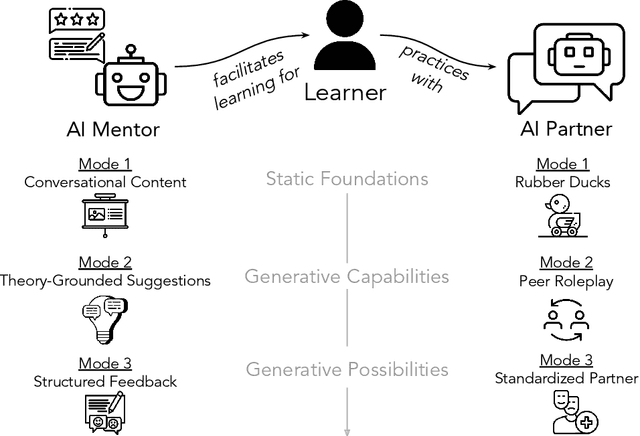
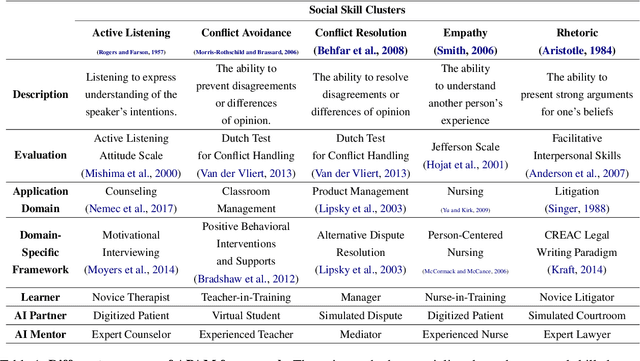
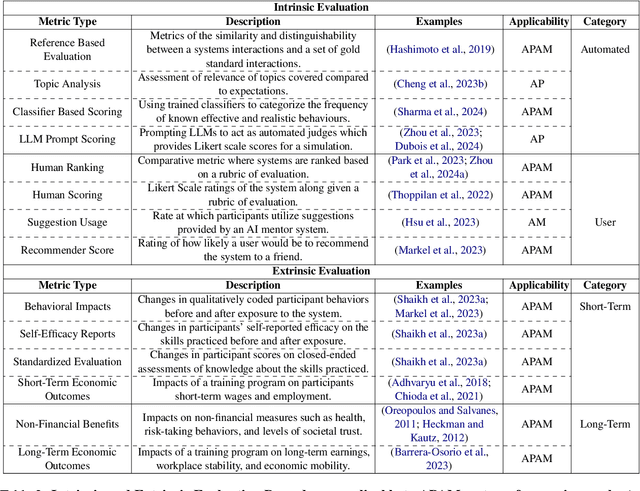
Abstract:People rely on social skills like conflict resolution to communicate effectively and to thrive in both work and personal life. However, practice environments for social skills are typically out of reach for most people. How can we make social skill training more available, accessible, and inviting? Drawing upon interdisciplinary research from communication and psychology, this perspective paper identifies social skill barriers to enter specialized fields. Then we present a solution that leverages large language models for social skill training via a generic framework. Our AI Partner, AI Mentor framework merges experiential learning with realistic practice and tailored feedback. This work ultimately calls for cross-disciplinary innovation to address the broader implications for workforce development and social equality.
Unintended Impacts of LLM Alignment on Global Representation
Feb 22, 2024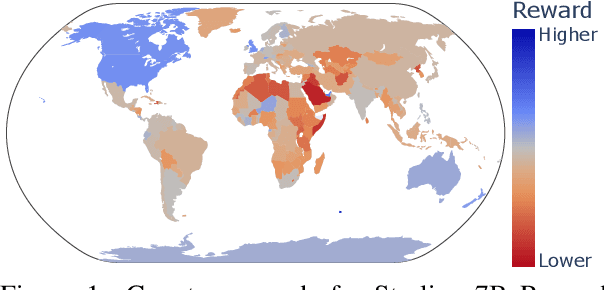

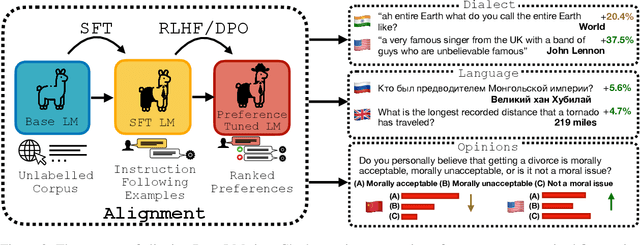
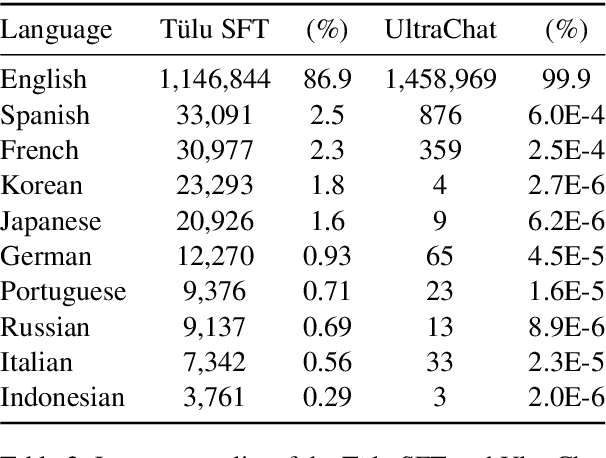
Abstract:Before being deployed for user-facing applications, developers align Large Language Models (LLMs) to user preferences through a variety of procedures, such as Reinforcement Learning From Human Feedback (RLHF) and Direct Preference Optimization (DPO). Current evaluations of these procedures focus on benchmarks of instruction following, reasoning, and truthfulness. However, human preferences are not universal, and aligning to specific preference sets may have unintended effects. We explore how alignment impacts performance along three axes of global representation: English dialects, multilingualism, and opinions from and about countries worldwide. Our results show that current alignment procedures create disparities between English dialects and global opinions. We find alignment improves capabilities in several languages. We conclude by discussing design decisions that led to these unintended impacts and recommendations for more equitable preference tuning.
A Material Lens on Coloniality in NLP
Nov 14, 2023Abstract:Coloniality, the continuation of colonial harms beyond "official" colonization, has pervasive effects across society and scientific fields. Natural Language Processing (NLP) is no exception to this broad phenomenon. In this work, we argue that coloniality is implicitly embedded in and amplified by NLP data, algorithms, and software. We formalize this analysis using Actor-Network Theory (ANT): an approach to understanding social phenomena through the network of relationships between human stakeholders and technology. We use our Actor-Network to guide a quantitative survey of the geography of different phases of NLP research, providing evidence that inequality along colonial boundaries increases as NLP builds on itself. Based on this, we argue that combating coloniality in NLP requires not only changing current values but also active work to remove the accumulation of colonial ideals in our foundational data and algorithms.
Task-Agnostic Low-Rank Adapters for Unseen English Dialects
Nov 02, 2023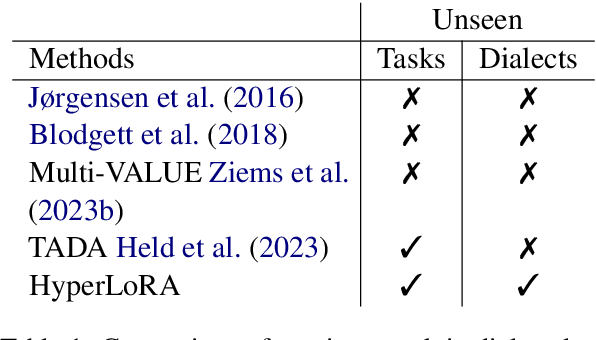
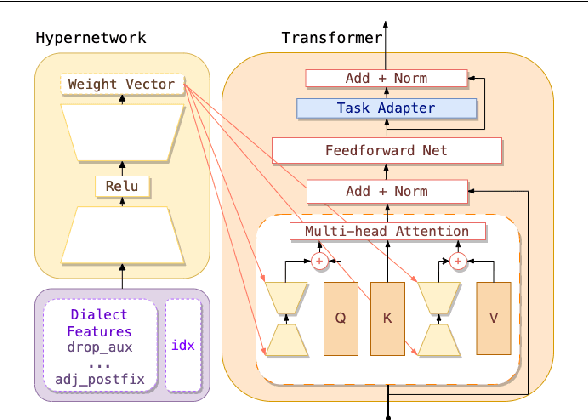
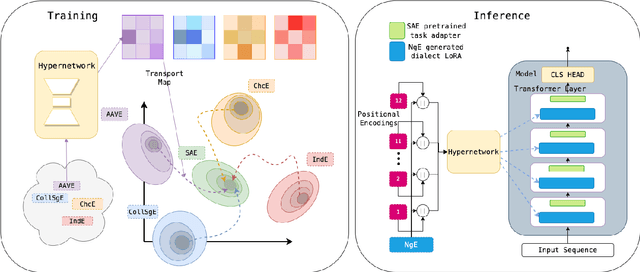

Abstract:Large Language Models (LLMs) are trained on corpora disproportionally weighted in favor of Standard American English. As a result, speakers of other dialects experience significantly more failures when interacting with these technologies. In practice, these speakers often accommodate their speech to be better understood. Our work shares the belief that language technologies should be designed to accommodate the diversity in English dialects and not the other way around. However, prior works on dialect struggle with generalizing to evolving and emerging dialects in a scalable manner. To fill this gap, our method, HyperLoRA, leverages expert linguistic knowledge to enable resource-efficient adaptation via hypernetworks. By disentangling dialect-specific and cross-dialectal information, HyperLoRA improves generalization to unseen dialects in a task-agnostic fashion. Not only is HyperLoRA more scalable in the number of parameters, but it also achieves the best or most competitive performance across 5 dialects in a zero-shot setting. In this way, our approach facilitates access to language technology for billions of English dialect speakers who are traditionally underrepresented.
 Add to Chrome
Add to Chrome Add to Firefox
Add to Firefox Add to Edge
Add to Edge